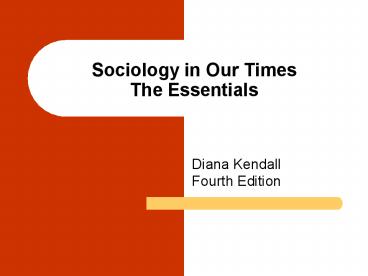Sociology in Our Times The Essentials - PowerPoint PPT Presentation
1 / 25
Title:
Sociology in Our Times The Essentials
Description:
Gain better understanding of ourselves and our social world. ... and visual texts (movies, television shows, advertisements, greeting cards) ... – PowerPoint PPT presentation
Number of Views:612
Avg rating:3.0/5.0
Title: Sociology in Our Times The Essentials
1
Sociology in Our TimesThe Essentials
- Diana Kendall Fourth Edition
2
Chapter 1
- The Sociological Perspective and Research Process
3
Chapter Outline
- Putting Social Life into Perspective
- Comparing Sociology with Other Social Sciences
- The Development of Sociological Thinking
- Contemporary Theoretical Perspectives
- The Sociological Research Process
- Research Methods
- Ethical Issues in Sociological Research
4
Why Study Sociology?
- Gain better understanding of ourselves and our
social world. - See how behavior is shaped by the groups to which
we belong. - Gain insight into society and the larger world
order.
5
Careers in Social Science
- Health and Human Services Counseling, Education,
Medicine, Social Work - Law Criminal Justice, Law
- Business Advertising, Labor Relations,
Management, Marketing - Communications Public Relations, Journalism,
Broadcasting - Academia
6
The Sociological Imagination
- Ability to see a relationship between individual
experiences and society. - The link between personal experience and social
contexts. - Distinguishes between personal troubles and
social issues.
7
Sociology and Anthropology
- Anthropology is the study of human existence over
geographic space and evolutionary time. - Sociology is the study of contemporary social
organization, relations, and change.
8
Sociology and Psychology
- Psychology is the study of behavior and mental
processeswhat occurs in the mind. - Sociological research examines the effects of
groups, organizations, and institutions on social
life.
9
Sociology and Political Science
- Political scientists concentrate on political
institutions. - Sociologists study political institutions within
the context of other social institutions, such as
families.
10
Early Social ThinkersAuguste Comte
- Considered to be the founder of sociology.
- Believed objective knowledge could only be
attained through science.
11
Early Social ThinkersHarriet Martineau
- Focused on social distinctions based on class,
race, and gender. - Believed society would improve if women and men
were treated equally, enlightened reform
occurred,and there was cooperation among all
social classes.
12
Early Social Thinkers Emile Durkheim
- Believed the limits of human potential are
socially, not biologically based. - Considered the founding figure of the
functionalist theoretical tradition.
13
Early Social Thinkers Karl Marx
- Viewed history as a clash between conflicting
ideas and forces. - Believed class conflict produced social change
and a better society. - Combined ideas from philosophy, history, and
social science into a new theory.
14
Early Social Thinkers Max Weber
- Believed sociological research should exclude a
researchers personal values and economic
interests. - Researchers should try to see the world as others
see it. - Provided insights on rationalization, bureaucracy
and religion.
15
Jane Adams
- Founded Hull House, one of the most famous
settlement houses, in Chicago. - One of the authors of a methodology use by
sociologists for the next forty years. - Awarded a Nobel Prize for assistance to the
underprivileged.
16
W. E. B. Du Bois
- One of the first to note double-consciousness,
the identity conflict of being both a black and
an American. - Pointed out that people in the U.S. espouse the
values of democracy, freedom, and equality while
they accept racism and group discrimination.
17
Major Theoretical Perspectives
18
Sociological Research
- Quantitative Research
- Goal is objectivity. Focus is on data that can be
measured numerically. - Qualitative research
- Words rather than numbers are used to analyze
meanings and patterns of social relationships.
19
Conventional Research Model
- Define the research problem.
- Review previous research.
- Formulate the hypothesis.
- Develop the research design.
- Collect and analyze the data.
- Draw conclusions and report the findings.
20
Qualitative Research Method
- Problem formulation is used to clarify a research
question and create questions for participants. - Researchers collect and analyze data to assess
the validity of the starting proposition. - Data is gathered in natural settings (homes and
workplaces) rather than a research setting.
21
Research Methods Survey Research
- Describes a population without interviewing each
individual. - Standardized questions force respondents into
categories in which they may not belong. - Relies on self-reported information and some
people may not be truthful.
22
Research Methods Analysis of Existing Data
- Analyze data originally collected by others.
- Materials studied may include
- written records (books, diaries, poems, and
graffiti) - narratives and visual texts (movies, television
shows, advertisements, greeting cards) - material culture (music, art, and even garbage)
23
Research Methods Field Research
- Study of social life in its natural setting.
- Observing and interviewing people where they
live, work, and play. - Generates observations that are best described
verbally rather than numerically.
24
Approaches to Field Research
- Participant observation
- Collecting observations while part of the
activities of the group being studied. - Ethnography
- Detailed study of the life and activities of a
group of people over a period of years.
25
Research Methods Experiments
- Study the impact of certain variables on
subjects attitudes or behavior. - Designed to create real-life situations.
- Used to demonstrate a cause-and-effect
relationship between variables.

